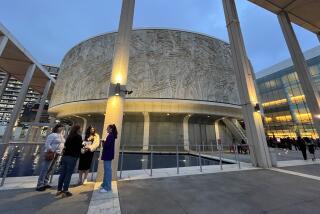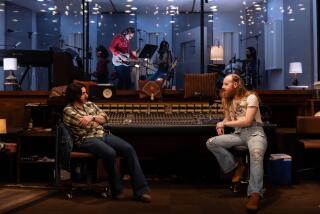Curtain rises on a stage drama
- Share via
EAST HADDAM, Conn. — The fates of this town of 8,000 and the Goodspeed Opera House have been tied together for 127 years.
It’s hard thinking of the town without thinking of the opera house -- a white Victorian confection known as a Tony-winning temple of new musical theater.
And the theater would not be the same were it not for the quaint New England flavor of East Haddam, with its historic houses, shops, farms, churches, winding roads and the picturesque Connecticut River flowing beside it.
But now the theater is considering building a new stage in nearby Middletown, a reenergized small industrial city that has offered the Goodspeed the moon in exchange for a share of its star power.
The Goodspeed’s leaders were surprised and impressed by the town’s offer, which includes a $5-million grant, expedited permits and free land downtown.
If the move is made, Goodspeed’s leaders will keep the historic theater where it is and present a summer show in it. But the whole Goodspeed campus -- including its nationally known set builders, painters and prop masters and its practice studios, expansive library, school, houses for actors and other assets -- would leave East Haddam.
“This is a unique situation. This town would be very difficult for us to leave,” said Goodspeed’s executive director, Michael Price. But the Middletown offer is attractive, he said.
Goodspeed has been planning for years to build a new theater with a larger stage to accommodate modern-day musicals and offer up-to-date amenities, Price said.
The theater was built in 1876. The upper floors housed the theater, while the lower floors were used for offices, a store and a steamship terminal.
The theater closed after the death of its builder, shipping magnate William Goodspeed. The state used the building to shelter snowplows while it awaited demolition. A group of theater lovers saved and restored the building, which reopened in 1963. But the building’s historic charms are not the main draw. “The site is a first-time attraction. People may be charmed by the plaster, but if you don’t give them a good entertainment value for their time and money, then they don’t come back,” Price said.
Theatergoers have to climb several flights of stairs or take the elevator to reach their seats. To accommodate patrons in wheelchairs, the theater simply unbolts seats from the floor. There are 398 seats, and the Goodspeed’s stage is 20 feet deep by 40 feet wide.
In this space, the Goodspeed has worked magic. The theater has won two special Tony Awards, sent 16 shows to Broadway and launched such musicals as “Man of La Mancha,” “Shenandoah” and “Annie.” But today’s spectacle-driven shows demand larger stages -- think of the gargantuan, ornate Oz setting, complete with flying monkeys, for “Wicked” or the spectacular Pride Rock in “The Lion King.”
A theater holding 700 or 800 seats and a 40-by-80-foot stage -- as big as a Broadway theater’s -- would be ideal. A larger stage also would mean that Goodspeed would not have to rework its shows for larger theaters on the road. And with more seats, fewer performances would be needed, cutting operating costs.
Parking in East Haddam is dear, and a drawbridge next to the theater is a picturesque nuisance, creating traffic jams that sometimes delay curtain times.
Expansion plans had been on hold while the town studied its future development, transportation and planning needs. The Goodspeed grumbled but seemed prepared to wait it out.
Into this inert atmosphere Middletown Mayor Domenique Thornton injected some energy. Just hours after she was sworn in to a fourth term as mayor, she made her pitch to Goodspeed’s leaders. “We made a really fantastic offer. It was a very bold move. It was a seize-the-day moment,” Thornton said.
Middletown is most famous as the home of Wesleyan University, one of the nation’s most competitive small liberal arts schools. While the city still has many manufacturing jobs, industry is fading in Connecticut, and the city is trying to reinvent itself as an arts community. The Goodspeed and its associated businesses generate $42 million annually for the Connecticut economy.
The theater, which has an $8-million annual budget, pays taxes on a restaurant and inn that it owns next to the theater building. East Haddam gets a payment instead of taxes from the Goodspeed for some of its other properties -- altogether about $40,000 for the town, said Brad Parker, a newly elected first selectman. That makes the Goodspeed one of East Haddam’s biggest taxpayers. The theater has 19,500 subscribers.
Middletown has long hankered for a theater, ever since one downtown theater was destroyed by fire and another closed.
“I feel it enriches the community culturally and socially to a level where there can never be any turning back for Middletown. It ensures the vitality of the community moving forward,” the mayor said.
Today, the surviving theater -- which now houses a liquor store -- is a possible site for a new Goodspeed. The theater is blighted and will be torn down anyway, and a nearby parking lot also is a possible site.
The city has offered to help find homes for the actors, whose contracts require housing near the theater.
Price estimated that the move to Middletown would cost $45 million and take three years. The theater would need serious donations to make the move happen. The 200-seat theater for new musicals in Chester would remain there, he said.
The Goodspeed’s board of directors is studying Middletown’s offer. A decision is expected in January.
Leaving would be painful, said Price, who is “pessimistic” about the future in East Haddam.
Across the street from the historic theater is East Haddam’s Town Hall -- a whiteclapboard building with four dormers that look out like two sets of opera glasses onto the Goodspeed Opera House.
Parker sat recently in his office, painted Wedgwood blue and decorated with a hand-braided wool rug, and wondered about the future.
Middletown’s offer has a lot going for it, he acknowledged. Building in East Haddam would require wetlands permits and pose traffic and parking problems and other hurdles. East Haddam can offer its location and community spirit, but it cannot begin to match Middletown’s generosity, he said.
Yet if the theater goes, the village’s shops, restaurants and inns might also close up, Parker worried.
“Goodspeed now has a decision to make. If they want to be a one-of-a-kind thing, they’ll stay in East Haddam and build within the quaint ambience of the village they have,” Parker said. “If they go to Main Street in Middletown, they’re just going to be another Main Street theater.”
More to Read
The biggest entertainment stories
Get our big stories about Hollywood, film, television, music, arts, culture and more right in your inbox as soon as they publish.
You may occasionally receive promotional content from the Los Angeles Times.










